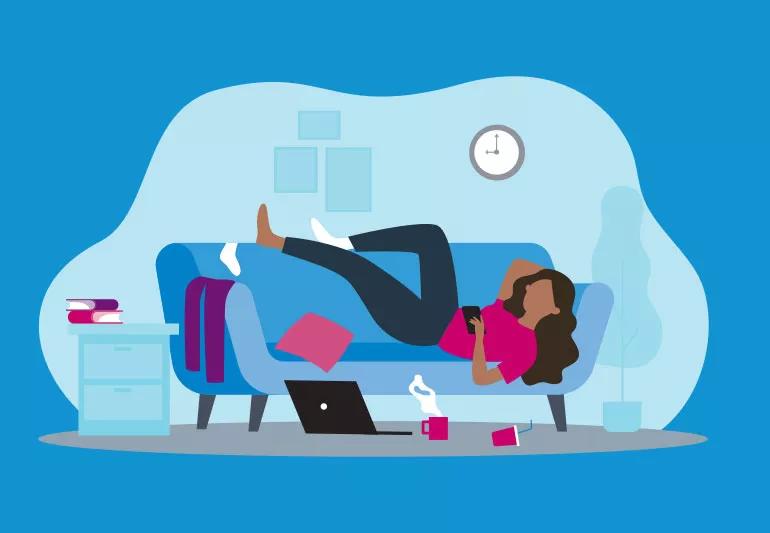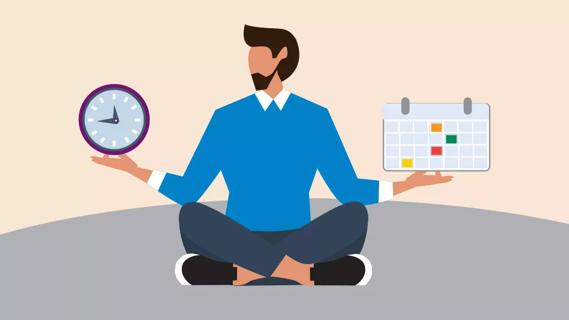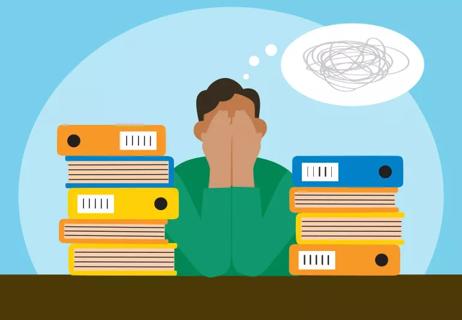Practical strategies to start getting things done

When you have a huge to-do list, the best thing is to prioritize and tackle tasks in order of importance. But our modern world is full of distractions that can tempt you to procrastinate. For example, maybe instead of paying bills, you’re sucked into binge-watching a TV series. Or rather than cleaning your home, you start doomscrolling.
Advertisement
Cleveland Clinic is a non-profit academic medical center. Advertising on our site helps support our mission. We do not endorse non-Cleveland Clinic products or services. Policy
It’s not the end of the world if your bedroom isn’t tidied up on time. Procrastination can be a problem if it affects your work or important tasks, though. Over time, procrastination can affect your finances and your self-worth, and even have a negative impact on your mental health.
Clinical psychologist Becky Tilahun, PhD, explains why we procrastinate and tips on how to stop.
Being someone who procrastinates is often very frustrating. You might be aware that you’re always running late with deadlines, yet you feel unable to change your ways.
There isn’t necessarily one specific reason why you might be prone to procrastination.
For example, maybe you’ve simply gotten into the habit of waiting until the last minute. Habits are behaviors that are formed over time.
Other people may just need help with time management skills or require more direction at work. “For a lot of procrastinators, it’s not that you don’t have time,” says Dr. Tilahun. “Maybe you’re not organized or don’t know how to budget your time. Maybe you don’t know how to use opportunities and resources properly.” Some procrastinators can also “feel overwhelmed or intimidated by a task, and may choose to work on one that’s less urgent but simpler,” she adds.
Advertisement
Your personality could also explain a tendency to procrastinate. You might be someone who lets your emotions dictate your actions. As a result, you may feel you need to be in a certain mindset to start a task.
Some people’s personalities are naturally easygoing and relaxed. Being so laid-back often means you don’t feel an urgency to meet deadlines. That means you might wait until the last minute and scramble to catch up.
In contrast, other people are perfectionists. If you’re a perfectionist, you tend to complete tasks on time. However, perfectionism itself can lead to procrastination because you’re so worried about the work not being perfect.
And, sometimes, we might put off doing even simple things just because we dislike them or simply don’t feel like making the effort. These tasks may take only a few minutes, but we still push them off. Why? This could be due to emotional fatigue or poor time management. You might also feel that doing a task later somehow makes it easier than doing it now.
Procrastination isn’t uncommon. And if you do it habitually, you often become used to operating that way. “You might have a tendency to do things at the last minute,” says Dr. Tilahun. “But you may only have a mild problem. Even if you tend to delay getting started on a task, you know you can still make it work. You know you procrastinate, but you feel you know how to manage it.”
Procrastination is more serious when it starts affecting your day-to-day life. If you delay paying a bill, for example, you could rack up late fees or other additional penalties. Or your job performance may also suffer, costing you opportunities at work.
In certain situations, your procrastination tendencies can also get worse. If you’re feeling emotional fatigue or burnout, prioritizing tasks becomes difficult and you might not be sure where to begin when faced with a big to-do list. These negative feelings can build up over time and snowball, affecting how you respond in the future to additional projects.
“It becomes a cycle,” Dr. Tilahun notes. “The guilt, self-criticism and discouragement affect your self-esteem. The next time you have to do a project, you have a lower sense of your capabilities. If you are more disciplined and complete a task right away, it’s going to help your self-esteem.”
Procrastination can also cause chronic stress, which over time can build up and cause health problems. “If you’re always completing tasks at the last minute, you’re always under pressure,” Dr. Tilahun says. Plus, when you do complete a task, you don’t feel the same sense of pride or accomplishment you might’ve had if you completed the projects on time.
Advertisement
“When you know you could have done a better job if you started a project a little earlier, and you realize you didn’t do your best, you can feel discouraged,” says Dr. Tilahun. “Procrastination can be destructive.”
Procrastination can make even simple tasks feel like mountains to climb. “The question is, ‘How can I bring myself to do that same task a little earlier?’” says Dr. Tilahun. Luckily, there are some concrete things you can adopt to start changing your habits for the better.
Self-awareness is “critical,” says Dr. Tilahun. “If you’re a procrastinator and you can still manage it and you know your limits, you might not be motivated to change, because it’s not costing you anything.”
However, if your procrastination “tends to be more moderate or severe, you have to realize the impact on your health, your performance at work and your general outlook on life,” she continues. “Increase your awareness of your emotional barriers — and develop a system to motivate yourself and modify your behavior.”
In a case like this, you have to work on yourself to overcome your procrastination tendencies. “Ask yourself why you’re putting something off and whether you find the task difficult or overwhelming,” advises Dr. Tilahun. “Ask yourself whether putting it off would make the task any easier.”
Advertisement
You can also reflect on your procrastination by doing a cost-benefit analysis — basically, weighing the pros and cons — of procrastination. “Ask yourself, ‘What do I get if I do it now versus if I do it later?’” says Dr. Tilahun. “That awareness can help prevent you from acting on your emotions and putting off an urgent task.”
This change might not happen right away. In fact, you might have to keep reminding yourself of the cost of procrastination. “Ask yourself, ‘What do I lose by completing this task now?’ By postponing this task, you’re prolonging the stress. You’re not getting rid of it.”
When you have a giant stack of things to do, it’s easy to get overwhelmed or feel unprepared to handle what’s ahead. Being under emotional stress or living with depression can also make it more difficult to start doing things.
Rewarding yourself is a great option. For example, if paying bills makes you tired, do a trade-off with something fun. “You can tell yourself, ‘I’m going to make only one phone call to pay one of my bills, and then I’m going to reward myself watching my favorite TV show for 30 minutes,’” suggests Dr. Tilahun. Next, you might go back and pay another bill, followed by 30 minutes of playing your favorite game. “For every small task you accomplish, reward yourself with something pleasant.”
Advertisement
If you’re overwhelmed by the thought of cleaning your entire messy house, break it down into tinier spaces. Pick one side of a room and tidy up for a finite amount of time — say, 10 minutes — and then reward yourself with a cookie. “The good thing is, once you get going, you might complete the whole room without a break,” Dr. Tilahun says. “But start with the minimum 10 minutes, followed by doing something fun for you.”
In some cases, there’s an underlying physical or mental cause to procrastination. “Many times, it’s emotional fatigue,” says Dr. Tilahun. This could be the byproduct of living with a diagnosable medical condition such as depression. At other times, you might be experiencing burnout.
“When you’re under constant stress or emotionally fatigued, it’s hard to get more organized and prioritize tasks,” Dr. Tilahun adds. “You don’t have the mental energy.” Talking to your doctor can be a big help. If they suspect your procrastination might have deeper roots, they can recommend best next steps.
It depends. “If you’re procrastinating because you’re struggling psychologically, or are emotionally or mentally fatigued, procrastination will go away whenever what is getting in the way is addressed.”
But if your procrastination is more of a habit, that can be reversed. “The problem with procrastinators is you’ve never broken that habit — and never felt the reward that comes from completing tasks on time,” says Dr. Tilahun. “In psychology, we say ‘Behavior rewarded, behavior repeated.’ If you become more self-aware of what you’re doing and tried taking care of your duties early a few times, you can change quickly because you want to keep doing it.”
Be aware, though, ingrained habits won’t change overnight. “When you’re trying to become an athlete, you train,” Dr. Tilahun says. “Training requires repeated behaviors. So be patient with yourself.”
Learn more about our editorial process.
Advertisement

Connecting with others, going for a walk or focusing on sleep quality can help more than you might realize

You may not always notice it, but your mental health has just as big of an impact on your well-being as your physical health

Rethinking your Mondays might make the ‘Sunday scaries’ a thing of the past

Get to know the resources they have on and off campus, including their friends

College is a time of big transitions, intense stress and major lifestyle changes

Wishing you made a different decision can help you learn from your mistakes

This term from TikTok encourages positive affirmations around ‘luck’

Start a conversation, gently ask questions and offer help without judgment

Type 2 diabetes isn’t inevitable with these dietary changes

Applying a hot or cold compress can help with pain